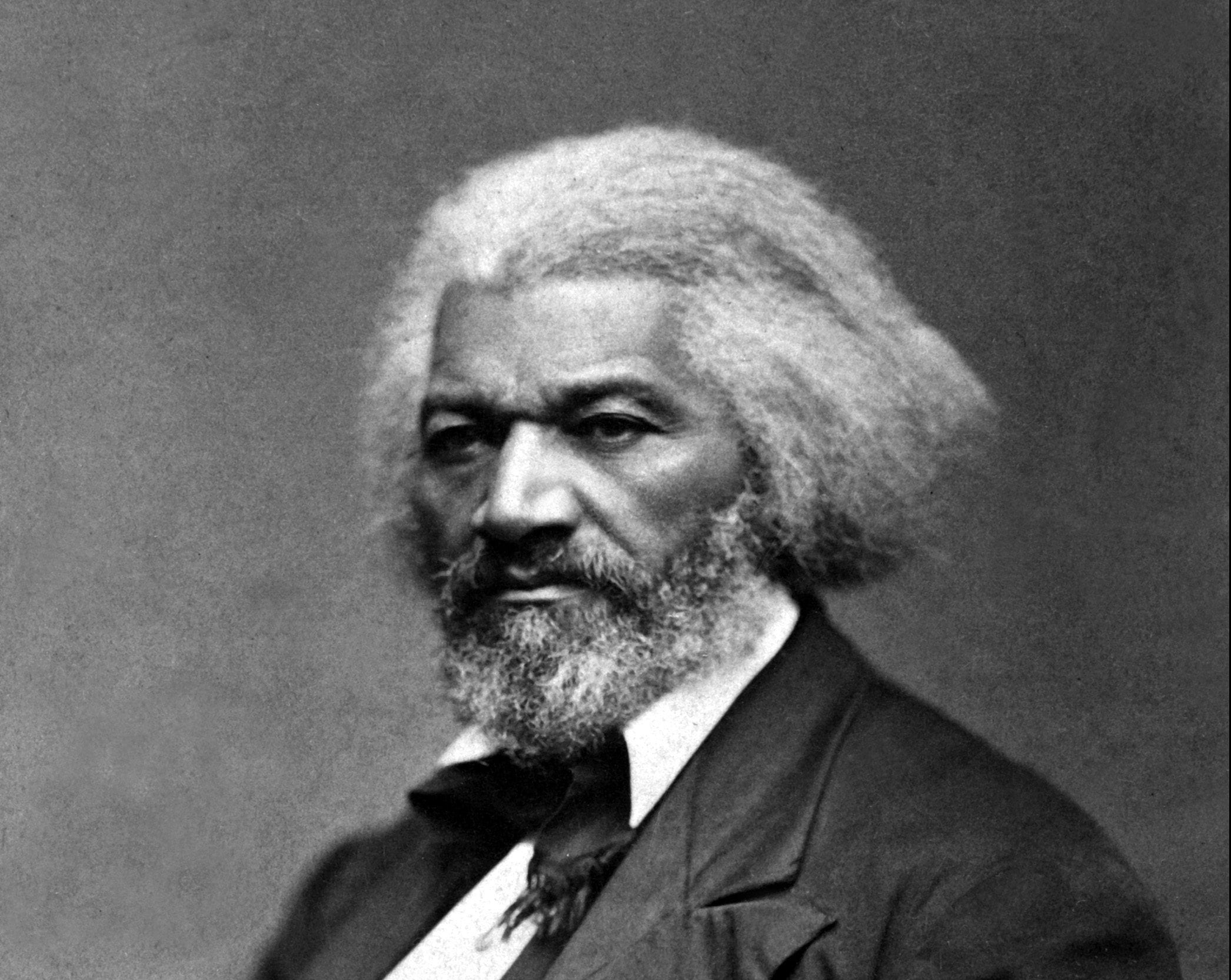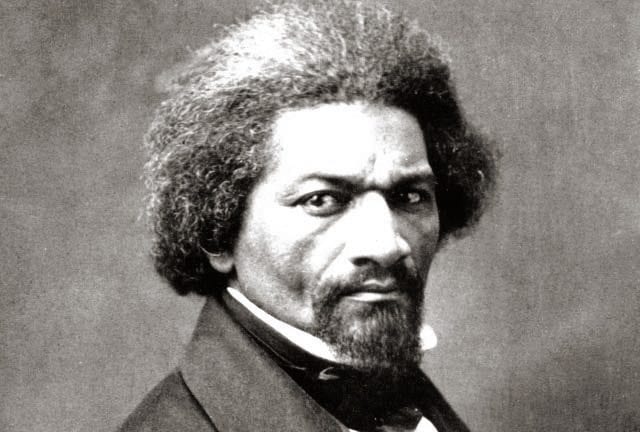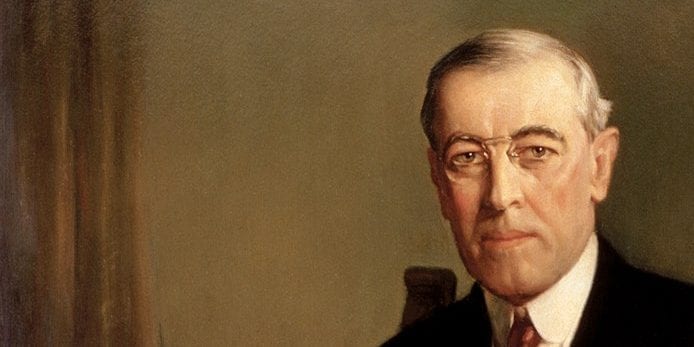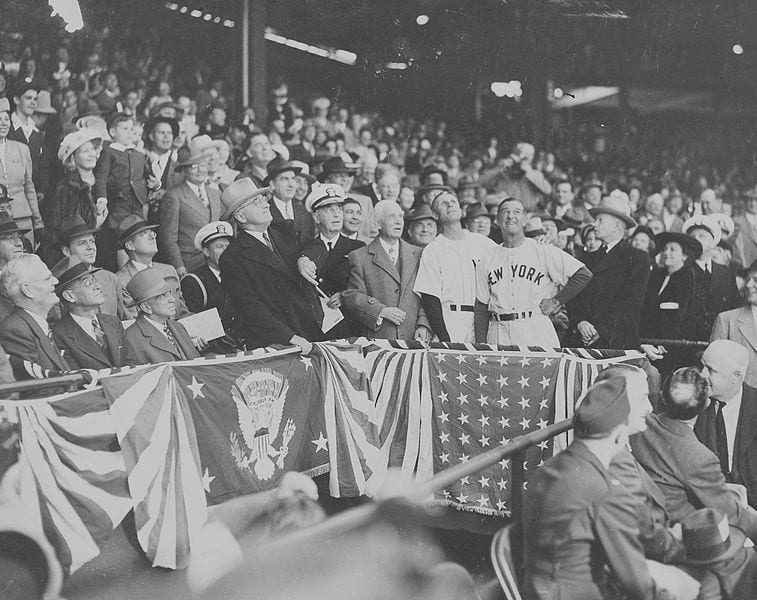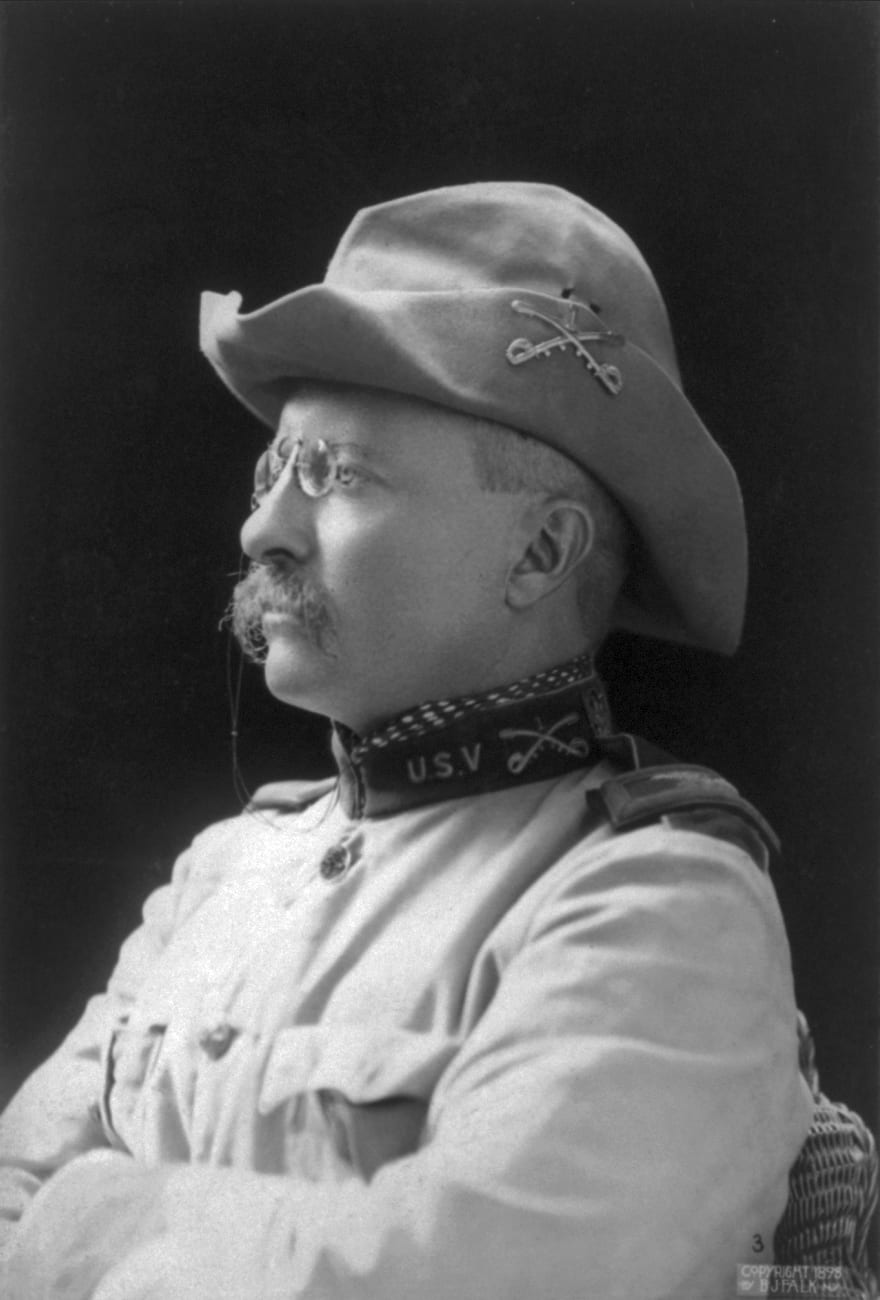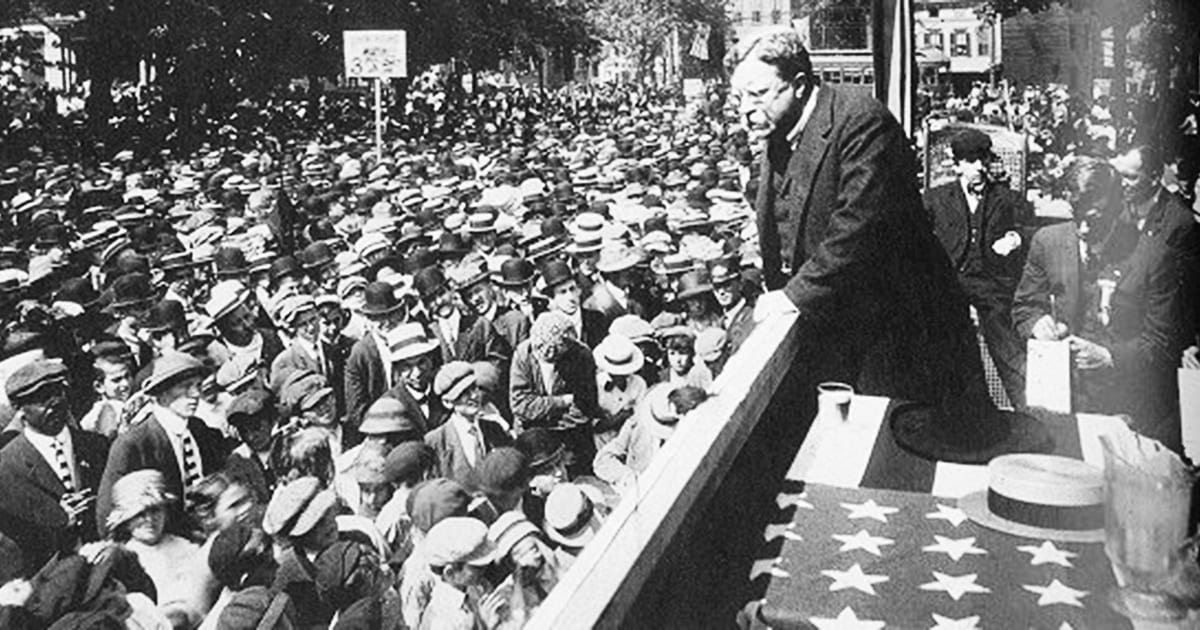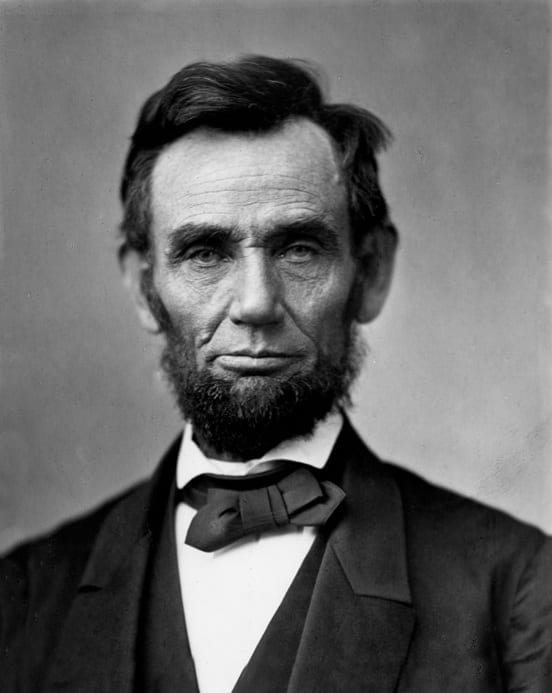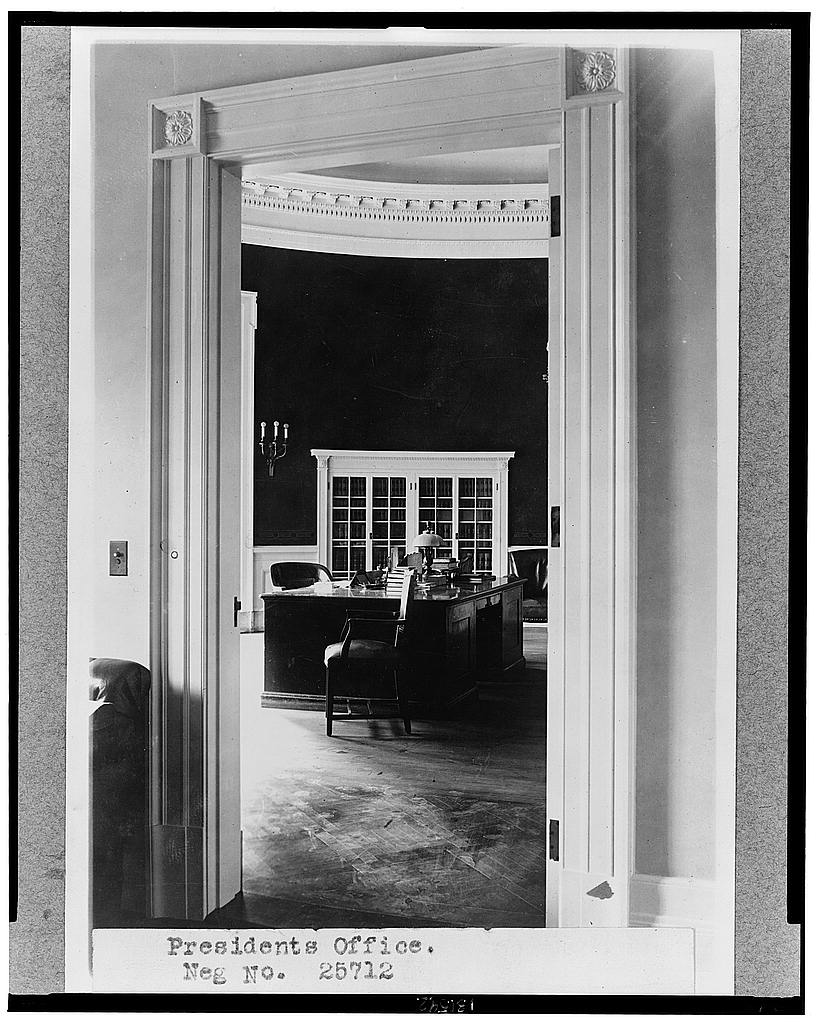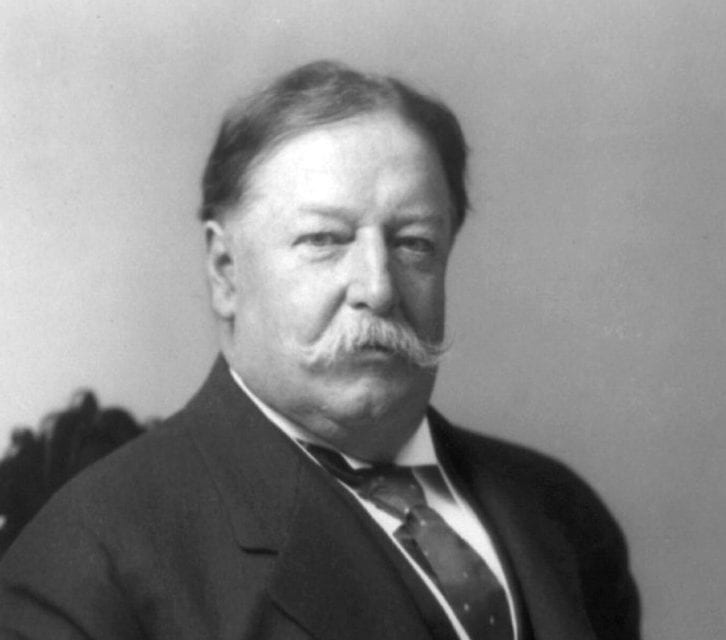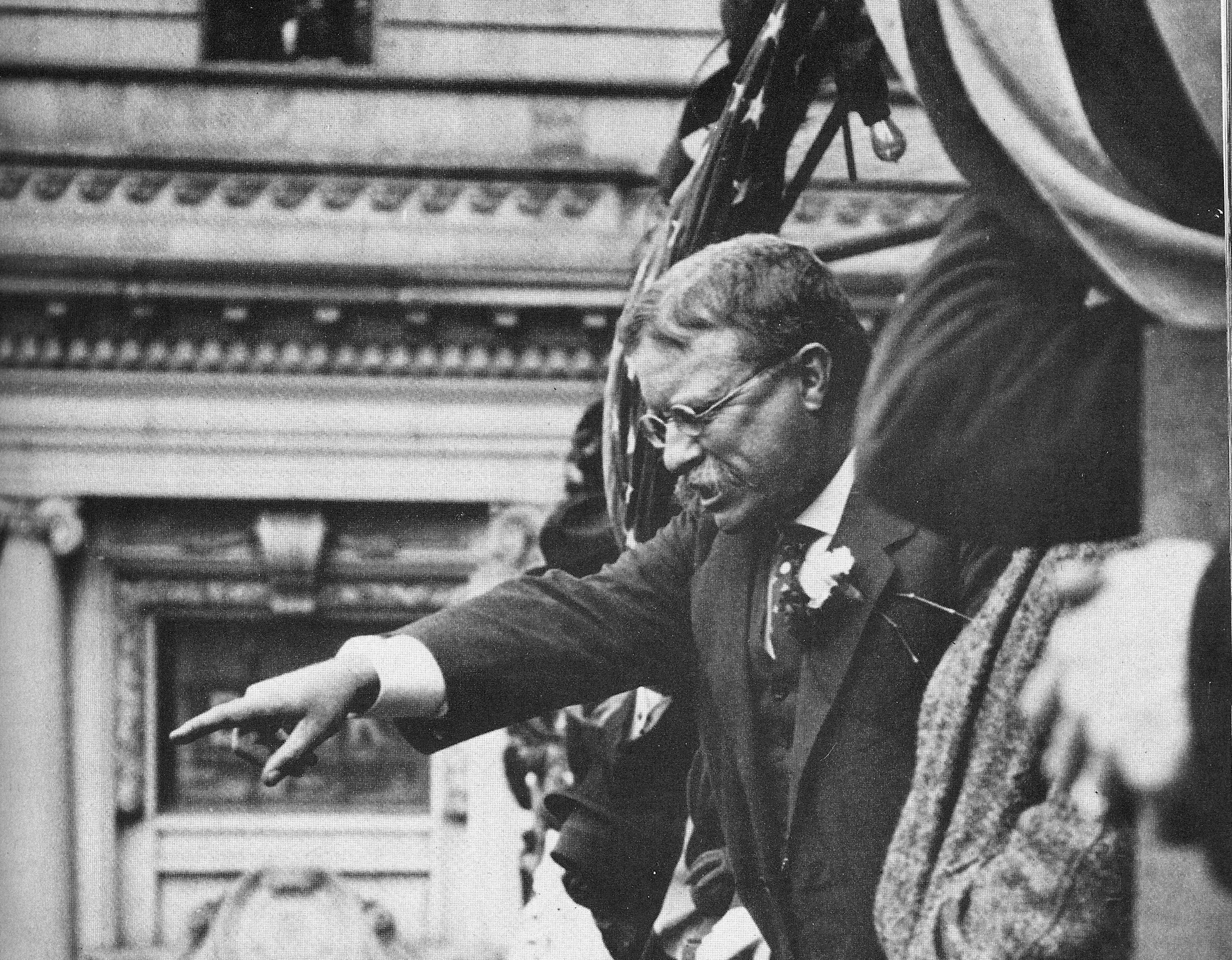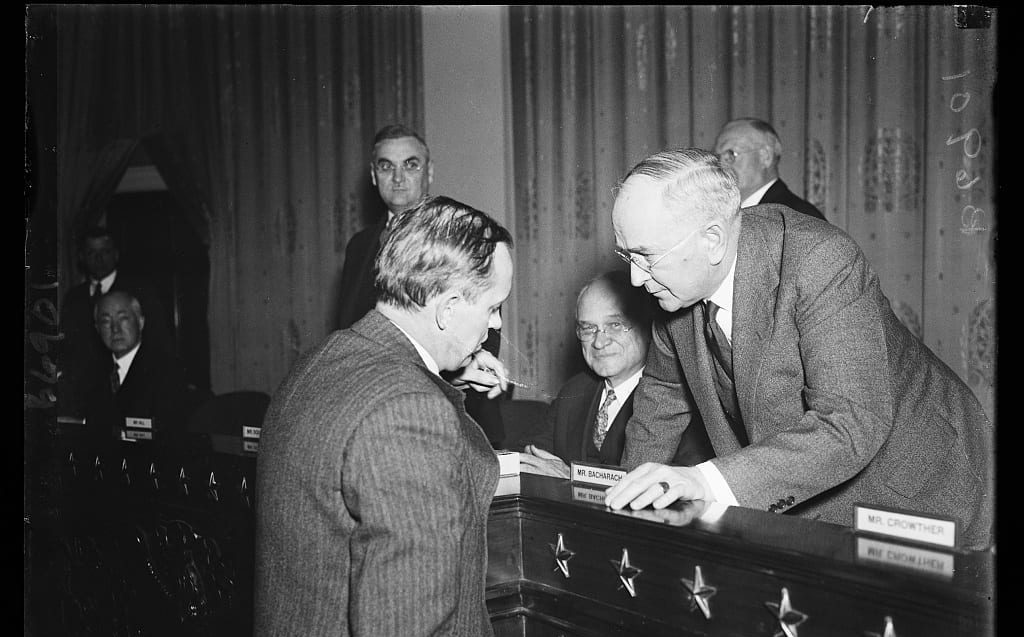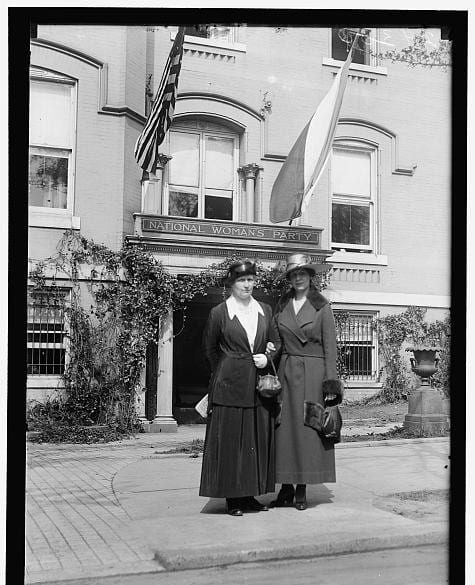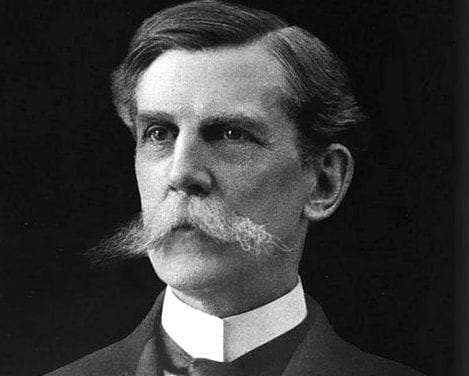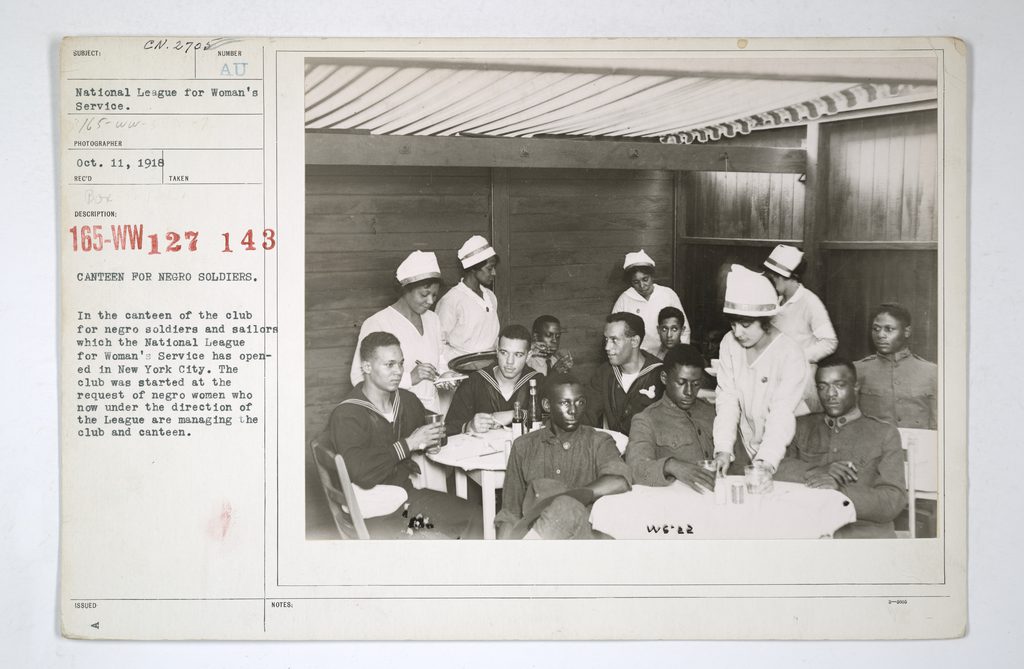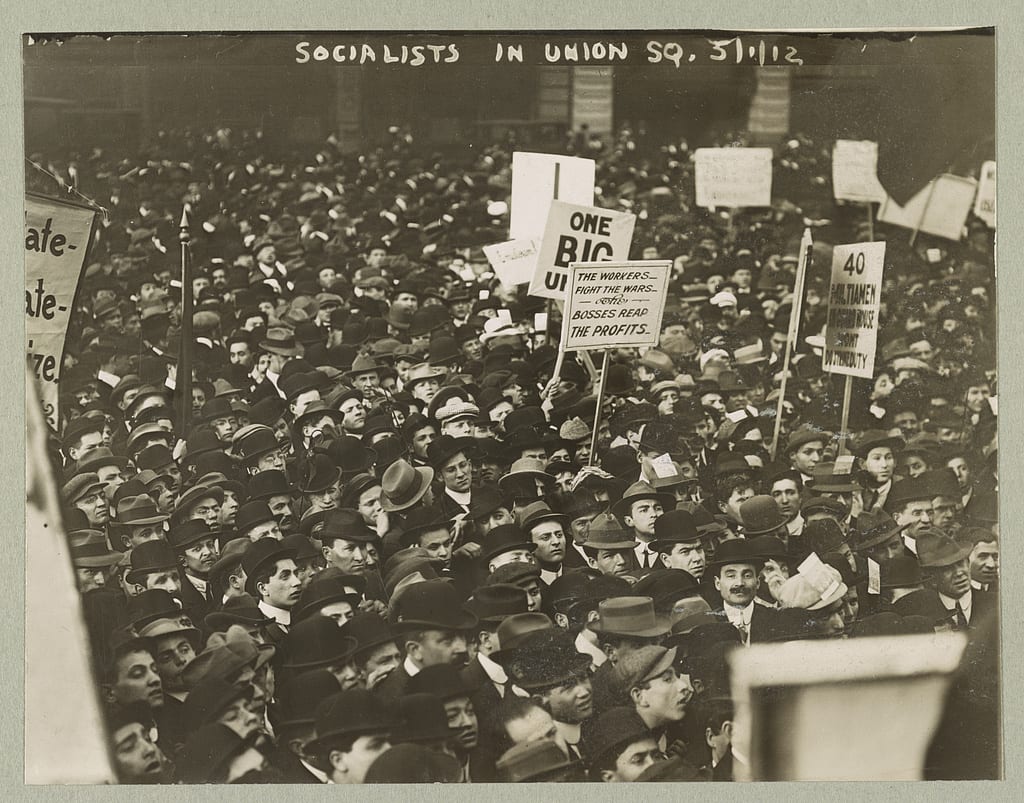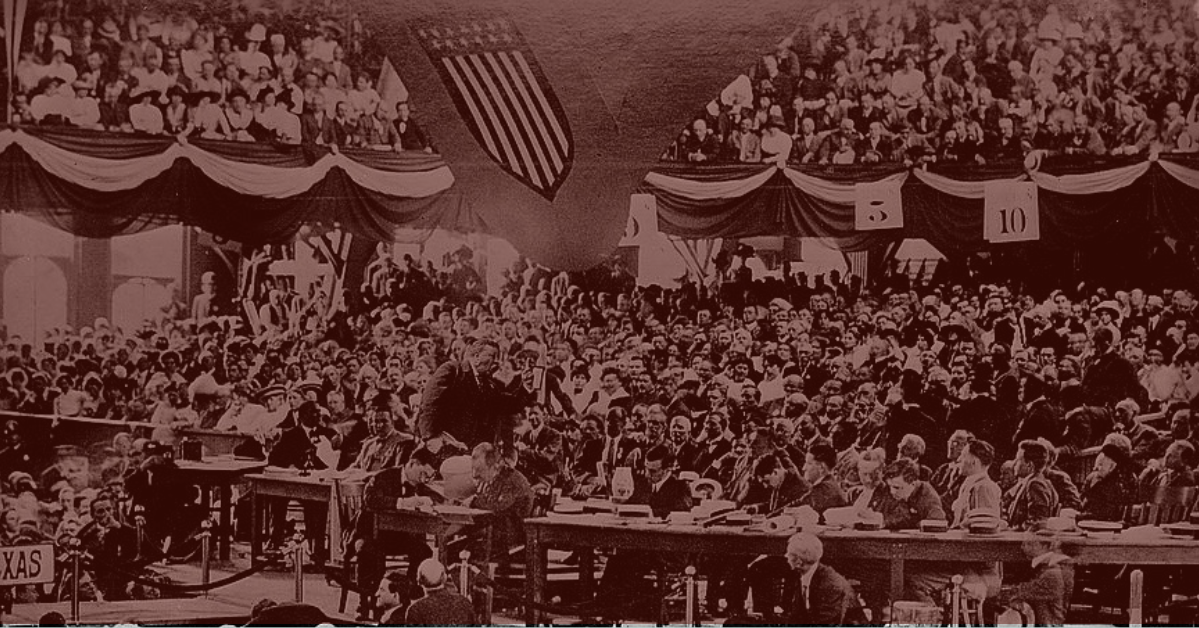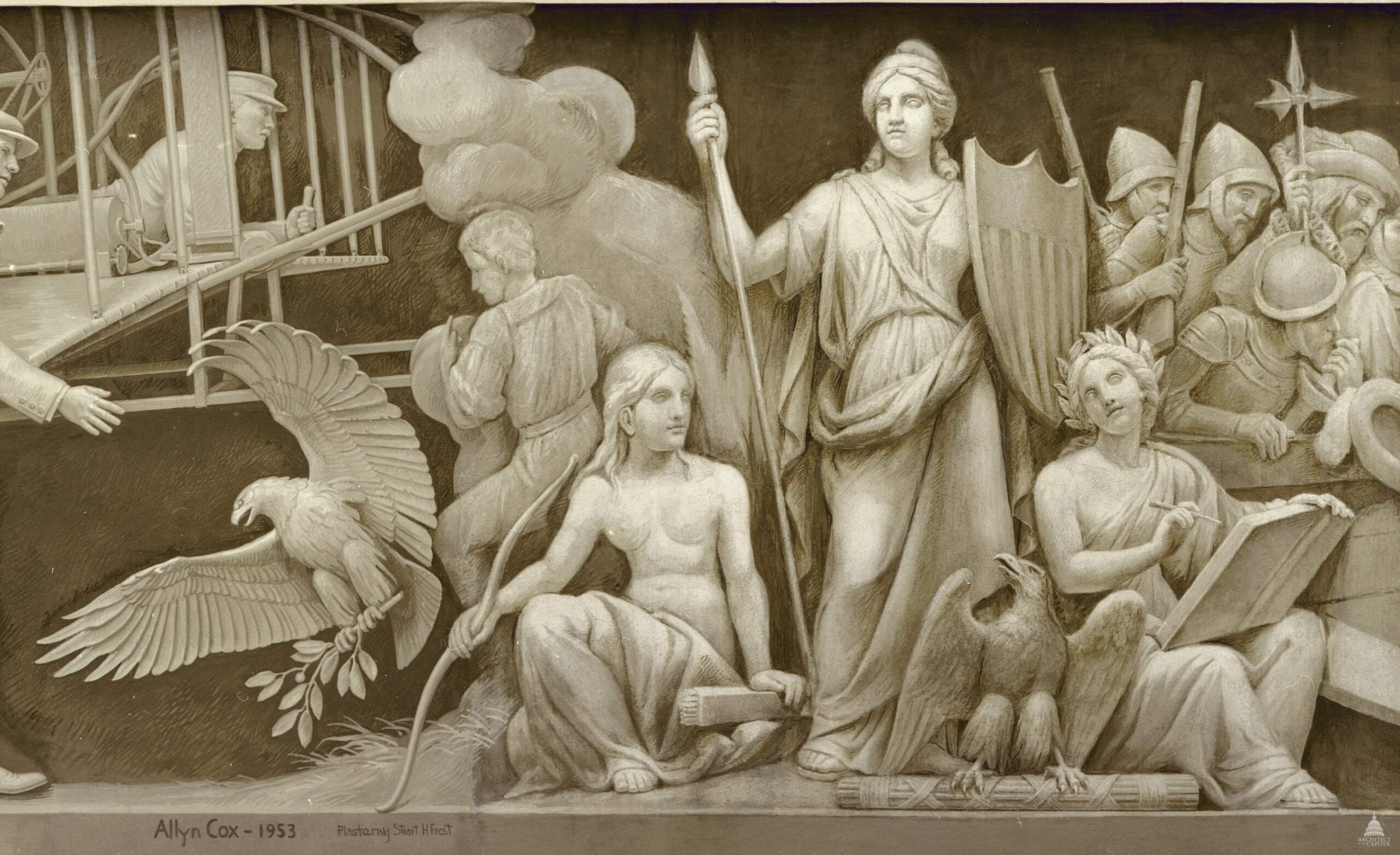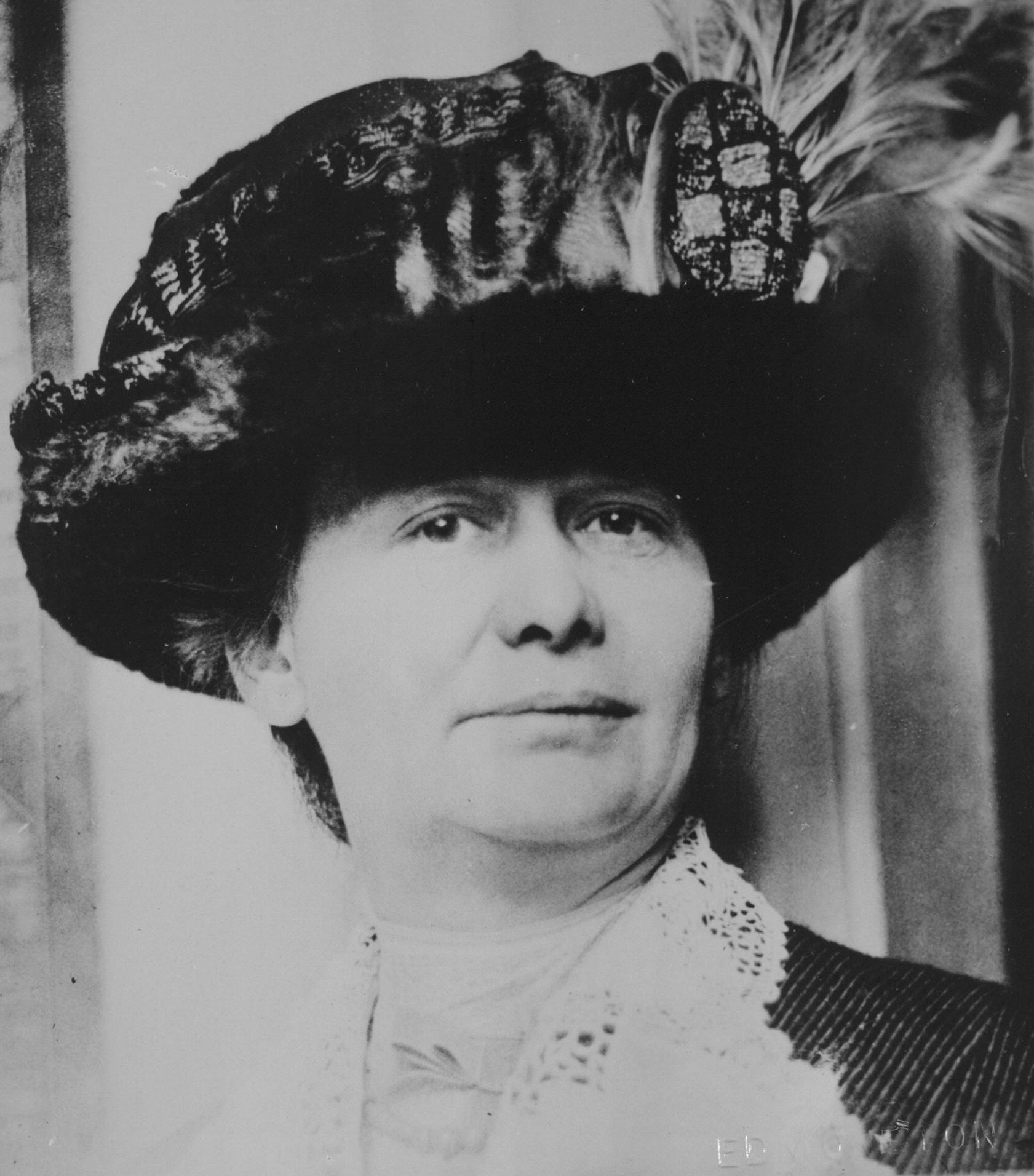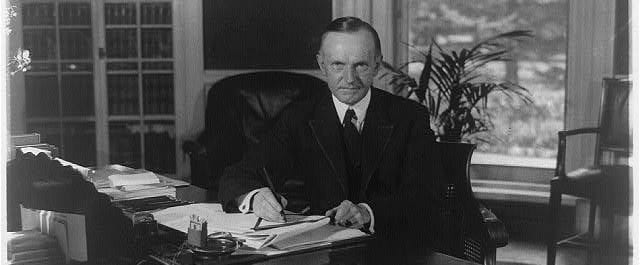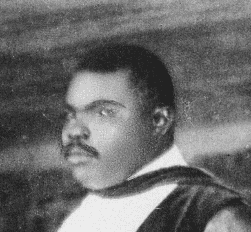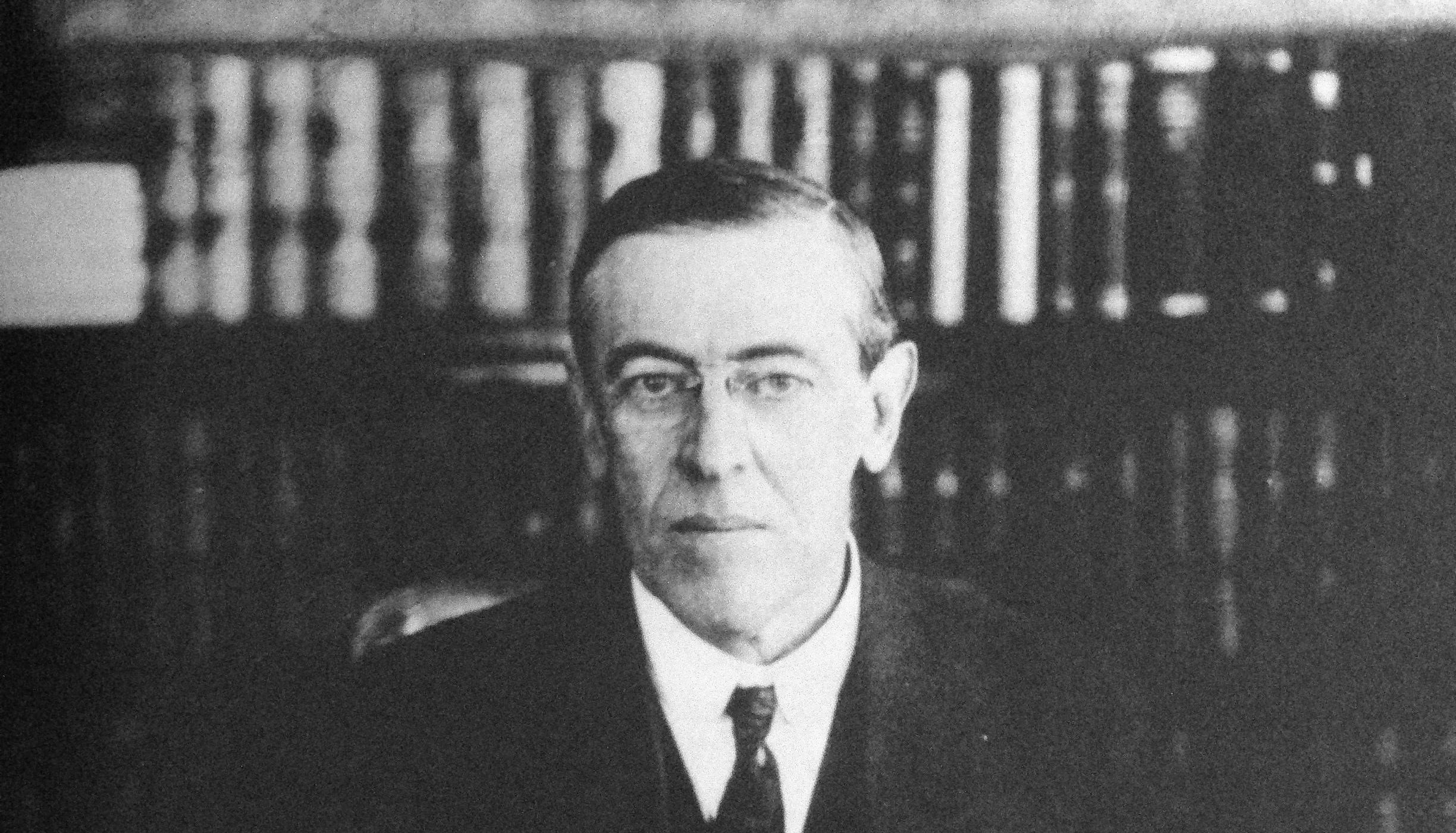
No study questions
No related resources
Source: Woodrow Wilson, Address at the City Hall Auditorium in Pueblo, September 25, 1919. Available at Gerhard Peters and John T. Woolley (eds.), The American Presidency Project, https://www.presidency.ucsb.edu/node/318184.
Mr. Chairman and fellow countrymen, it is with a great deal of genuine pleasure that I find myself in Pueblo, and I feel it a compliment that I should be permitted to be the first speaker in this beautiful hall. One of the advantages of this hall, as I look about, is that you are not too far away from me, because there is nothing so reassuring to men who are trying to express the public sentiment as getting into real personal contact with their fellow citizens. I have gained a renewed impression as I have crossed the continent this time of the homogeneity of this great people to whom we belong. They come from many stocks, but they are all of one kind. They come from many origins, but they are all shot through with the same principles and desire the same righteous and honest things. I have received a more inspiring impression this time of the public opinion of the United States than it was ever my privilege to receive before.
The chief pleasure of my trip has been that it has nothing to do with my personal fortunes, that it has nothing to do with my personal reputation, that it has nothing to do with anything except great principles uttered by Americans of all sorts and of all parties which we are now trying to realize at this crisis of the affairs of the world. But there have been unpleasant impressions as well as pleasant impressions, my fellow citizens, as I have crossed the continent. I have perceived more and more that men have been busy creating an absolutely false impression of what the treaty of peace and the covenant of the League of Nations contain and mean….
Do not think of this treaty of peace as merely a settlement with Germany.1 It is that. It is a very severe settlement with Germany, but there is not anything in it that she did not earn. Indeed, she earned more than she can ever be able to pay for, and the punishment exacted of her is not a punishment greater than she can bear, and it is absolutely necessary in order that no other nation may ever plot such a thing against humanity and civilization. But the treaty is so much more than that. It is not merely a settlement with Germany; it is a readjustment of those great injustices which underlie the whole structure of European and Asiatic society. This is only the first of several treaties. They are all constructed upon the same plan. The Austrian treaty follows the same lines.2 The treaty with Hungary follows the same lines.3 The treaty with Bulgaria follows the same lines.4 The treaty with Turkey, when it is formulated, will follow the same lines.5 What are those lines? They are based upon the purpose to see that every government dealt with in this great settlement is put in the hands of the people and taken out of the hands of coteries6 and of sovereigns who had no right to rule over the people. It is a people’s treaty that accomplishes by a great sweep of practical justice the liberation of men who never could have liberated themselves, and the power of the most powerful nations has been devoted not to their aggrandizement but to the liberation of people whom they could have put under their control if they had chosen to do so. Not one foot of territory is demanded by the conquerors, not one single item of submission to their authority is demanded by them. The men who sat around that table in Paris knew that the time had come when the people were no longer going to consent to live under masters, but were going to live the lives that they chose themselves, to live under such governments as they chose themselves to erect. That is the fundamental principle of this great settlement.
And we did not stop with that. We added a great international charter for the rights of labor. Reject this treaty, impair it, and this is the consequence to the laboring men of the world, that there is no international tribunal which can bring the moral judgments of the world to bear upon the great labor questions of the day. What we need to do with regard to the labor questions of the day, my fellow countrymen, is tilt them into the light, is to lift them out of the haze and distraction of passion, of hostility, out into the calm spaces where men look at things without passion. The more men you get into a great discussion is the more you exclude passion. Just so soon as the calm judgment of the world is directed upon the question of justice to labor, labor is going to have a forum such as it never was supplied with before, and men everywhere are going to see that the problem of labor is nothing more nor less than the problem of the elevation of humanity. We must see that all the questions which have disturbed the world, all the questions which have eaten into the confidence of men toward their governments, all the questions which have disturbed the processes of industry, shall be brought out where men of all points of view, men of all attitudes of mind, men of all kinds of experience, may contribute their part to the settlement of the great questions which we must settle and cannot ignore.
At the front of this great treaty is put the covenant of the League of Nations. It will also be at the front of the Austrian treaty and the Hungarian treaty and the Bulgarian treaty and the treaty with Turkey. Every one of them will contain the covenant of the League of Nations, because you cannot work any of them without the covenant of the League of Nations. Unless you get the united, concerted purpose and power of the great governments of the world behind this settlement, it will fall down like a house of cards. There is only one power to put behind the liberation of mankind, and that is the power of mankind. It is the power of the united moral forces of the world, and in the covenant of the League of Nations the moral forces of the world are mobilized. For what purpose? Reflect, my fellow citizens, that the membership of this great league is going to include all the great fighting nations of the world, as well as the weak ones. It is not for the present going to include Germany, but for the time being Germany is not a great fighting country. All the nations that have power that can be mobilized are going to be members of this league, including the United States. And what do they unite for? They enter into a solemn promise to one another that they will never use their power against one another for aggression; that they never will impair the territorial integrity of a neighbor; that they never will interfere with the political independence of a neighbor; that they will abide by the principle that great populations are entitled to determine their own destiny and that they will not interfere with that destiny; and that no matter what differences arise amongst them they will never resort to war without first having done one or other of two things—either submitted the matter of controversy to arbitration, in which case they agree to abide by the result without question, or submitted it to the consideration of the council of the League of Nations, laying before that council all the documents, all the facts, agreeing that the council can publish the documents and the facts to the whole world, agreeing that there shall be six months allowed for the mature consideration of those facts by the council, and agreeing that at the expiration of the six months, even if they are not then ready to accept the advice of the council with regard to the settlement of the dispute, they will still not go to war for another three months. In other words, they consent, no matter what happens, to submit every matter of difference between them to the judgment of mankind, and just so certainly as they do that, my fellow citizens, war will be in the far background, war will be pushed out of that foreground of terror in which it has kept the world for generation after generation, and men will know that there will be a calm time of deliberate counsel. The most dangerous thing for a bad cause is to expose it to the opinion of the world. The most certain way that you can prove that a man is mistaken is by letting all his neighbors know what he thinks, by letting all his neighbors discuss what he thinks, and if he is in the wrong you will notice that he will stay at home, he will not walk on the street. He will be afraid of the eyes of his neighbors. He will be afraid of their judgment of his character. He will know that his cause is lost unless he can sustain it by the arguments of right and of justice. The same law that applies to individuals applies to nations.
But, you say, “We have heard that we might be at a disadvantage in the League of Nations.” Well, whoever told you that either was deliberately falsifying or he had not read the covenant of the League of Nations. I leave him the choice. I want to give you a very simple account of the organization of the League of Nations and let you judge for yourselves. It is a very simple organization. The power of the league, or rather the activities of the league, lie in two bodies. There is the council, which consists of one representative from each of the principal Allied and associated powers—that is to say, the United States, Great Britain, France, Italy, and Japan—along with four other representatives of smaller powers chosen out of the general body of the membership of the league. The council is the source of every active policy of the league, and no active policy of the league can be adopted without a unanimous vote of the council. That is explicitly stated in the covenant itself. Does it not evidently follow that the League of Nations can adopt no policy whatever without the consent of the United States?…
. . . Article 10 is the heart of the whole matter. What is article 10? I never am certain that I can from memory give a literal repetition of its language, but I am sure that I can give an exact interpretation of its meaning. Article 10 provides that every member of the league covenants to respect and preserve the territorial integrity and existing political independence of every other member of the league as against external aggression….
But you will say, “What is the second sentence of article 10? That is what gives very disturbing thoughts. The second sentence is that the council of the league shall advise what steps, if any, are necessary to carry out the guaranty of the first sentence, namely, that the members will respect and preserve the territorial integrity and political independence of the other members. I do not know any other meaning for the word “advise” except “advise.” The council advises, and it cannot advise without the vote of the United States. Why gentlemen should fear that the Congress of the United States would be advised to do something that it did not want to do I frankly cannot imagine, because they cannot even be advised to do anything unless their own representative has participated in the advice. It may be that that will impair somewhat the vigor of the league, but, nevertheless, the fact is so, that we are not obliged to take any advice except our own, which to any man who wants to go his own course is a very satisfactory state of affairs. Every man regards his own advice as best, and I dare say every man mixes his own advice with some thought of his own interest. Whether we use it wisely or unwisely, we can use the vote of the United States to make impossible drawing the United States into any enterprise that she does not care to be drawn into.
Yet article 10 strikes at the taproot of war. Article 10 is a statement that the very things that have always been sought in imperialistic wars are henceforth foregone by every ambitious nation in the world. I would have felt very lonely, my fellow countrymen, and I would have felt very much disturbed if, sitting at the peace table in Paris, I had supposed that I was expounding my own ideas. Whether you believe it or not, I know the relative size of my own ideas; I know how they stand related in bulk and proportion to the moral judgments of my fellow countrymen, and I proposed nothing whatever at the peace table at Paris that I had not sufficiently certain knowledge embodied the moral judgment of the citizens of the United States. I had gone over there with, so to say, explicit instructions. Don’t you remember that we laid down fourteen points7 which should contain the principles of the settlement? They were not my points. In every one of them I was conscientiously trying to read the thought of the people of the United States, and after I uttered those points I had every assurance given me that could be given me that they did speak the moral judgment of the United States and not my single judgment. Then when it came to that critical period just a little less than a year ago, when it was evident that the war was coming to its critical end, all the nations engaged in the war accepted those fourteen principles explicitly as the basis of the armistice and the basis of the peace.8 In those circumstances I crossed the ocean under bond to my own people and to the other governments with which I was dealing…. . . .
The covenant in another portion guarantees to the members the independent control of their domestic questions. There is not a leg for these gentlemen to stand on when they say that the interests of the United States are not safeguarded in the very points where we are most sensitive. You do not need to be told again that the covenant expressly says that nothing in this covenant shall be construed as affecting the validity of the Monroe Doctrine, for example.9 You could not be more explicit than that….
I am dwelling upon these points, my fellow citizens, in spite of the fact that I dare say to most of you they are perfectly well known, because in order to meet the present situation we have got to know what we are dealing with. We are not dealing with the kind of document which this is represented by some gentlemen to be; and inasmuch as we are dealing with a document simon-pure in respect of the very principles we have professed and lived up to, we have got to do one or other of two things—we have got to adopt it or reject it. There is no middle course. You cannot go in on a special-privilege basis of your own. I take it that you are too proud to ask to be exempted from responsibilities which the other members of the league will carry.10 We go in upon equal terms or we do not go in at all; and if we do not go in, my fellow citizens, think of the tragedy of that result—the only sufficient guaranty to the peace of the world withheld! Ourselves drawn apart with that dangerous pride which means that we shall be ready to take care of ourselves, and that means that we shall maintain great standing armies and an irresistible navy; that means we shall have the organization of a military nation; that means we shall have a general staff, with the kind of power that the General Staff of Germany had; to mobilize this great manhood of the nation when it pleases, all the energy of our young men drawn into the thought and preparation for war. What of our pledges to the men that lie dead in France? We said that they went over there not to prove the prowess of America or her readiness for another war but to see to it that there never was such a war again. It always seems to make it difficult for me to say anything, my fellow citizens, when I think of my clients in this case. My clients are the children; my clients are the next generation. They do not know what promises and bonds I undertook when I ordered the armies of the United States to the soil of France, but I know, and I intend to redeem my pledges to the children; they shall not be sent upon a similar errand.
Again and again, my fellow citizens, mothers who lost their sons in France have come to me and, taking my hand, have shed tears upon it not only, but they have added, “God bless you, Mr. President!” Why, my fellow citizens, should they pray God to bless me? I advised the Congress of the United States to create the situation that led to the death of their sons. I ordered their sons overseas. I consented to their sons being put in the most difficult parts of the battle line, where death was certain, as in the impenetrable difficulties of the forest of Argonne.11 Why should they weep upon my hand and call down the blessings of God upon me? Because they believe that their boys died for something that vastly transcends any of the immediate and palpable objects of the war. They believe, and they rightly believe, that their sons saved the liberty of the world. They believe that wrapped up with the liberty of the world is the continuous protection of that liberty by the concerted powers of all civilized people. They believe that this sacrifice was made in order that other sons should not be called upon for a similar gift—the gift of life, the gift of all that died—and if we did not see this thing through, if we fulfilled the dearest present wish of Germany and now dissociated ourselves from those alongside whom we fought in the world, would not something of the halo go away from the gun over the mantelpiece, or the sword? Would not the old uniform lose something of its significance? These men were crusaders. They were not going forth to prove the might of the United States. They were going forth to prove the might of justice and right, and all the world accepted them as crusaders, and their transcendent achievement has made all the world believe in America as it believes in no other nation organized in the modern world. There seem to me to stand between us and the rejection or qualification of this treaty the serried ranks of those boys in khaki, not only these boys who came home, but those dear ghosts that still deploy upon the fields of France….
- 1. The Treaty of Versailles (June 28, 1919) concluded peace between the Allies and Germany.
- 2. The Treaty of Saint-Germain (September 10, 1919) dissolved the Austro-Hungarian Empire and created the new nations of Austria, Czechoslovakia, Poland, and Yugoslavia.
- 3. The Treaty of Trianon (June 4, 1920) concluded peace between the Allies and Hungary.
- 4. The Treaty of Neuilly-sur-Seine concluded peace between the Allies and Bulgaria.
- 5. The Treaty of Sevres (1920) attempted to conclude peace between the Allies and the Ottoman Empire but remained unratified. The Treaty of Lausanne (1923) finalized peace and established the new nation of Turkey.
- 6. An exclusive, small group of people.
- 7. See Document 14.
- 8. The Germans requested an armistice based on the Fourteen Points, and Wilson agreed to use them as the basis for peace negotiations once the Kaiser had abdicated. T he Armistice of November 11, 1918, however, required German demilitarization, withdrawal from occupied territories, and Allied occupation of three bridgeheads in the Rhineland—signaling that the Allies intended to impose a punitive peace on Germany.
- 9. Article 21 stated: “Nothing in this Covenant shall be deemed to affect the validity of international engagements, such as treaties of arbitration or regional understandings like the Monroe doctrine, for securing the maintenance of peace.”
- 10. Wilson was referring Senator Henry Cabot Lodge’s proposal that the United States add reservations or amendments to the treaty to protect Congress’s war-making powers and unilateral control over U.S. foreign policy (see Document 23).
- 11. The Meuse-Argonne Offensive (September 26–November 11, 1918) was one of the most lethal battles in U.S. history.
Abrams v. United States
November 10, 1919
Conversation-based seminars for collegial PD, one-day and multi-day seminars, graduate credit seminars (MA degree), online and in-person.



